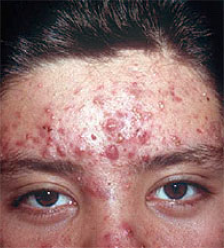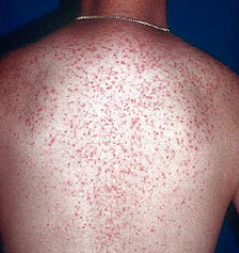 Acne: Who gets it and why?
Acne: Who gets it and why?
Acne is common. It affects more than 90 percent of people at some point in their lives. Acne for teens usually begins soon after the start of puberty. There are many different factors that play a role in the development of acne.
Sebum is produced by the oil glands in the skin, particularly after increased hormones at the time of puberty. The hair follicle, the site of acne, may get plugged with dead skin cells, and the sebum and bacteria may accumulate and lead to pimples with redness and discomfort.
What does it look like?
A blackhead is formed when the pressure of the sebum and dead cells force the plug to the surface of the skin. The color of the blackhead is caused by skin pigment and dead skin cells. Blackheads are not caused by dirt and dirt does not cause acne. Blackheads cannot be washed or scrubbed away.
A whitehead occurs when the plug remains below the skin surface. When the pressure from the sebum and dead cells becomes great, the trapped material may seep through the walls of the follicle and cause redness and discomfort. This forms the pimple (papule) and pus bump (pustule).

This teenager has pimples & blackheads over the back.
A cyst is a particularly deep and uncomfortable swelling associated with acne.
Scarring may occur after papules, pustules and cysts. Once scarring occurs, the change is permanent. However, a dermatologist may perform certain procedures to improve the cosmetic appearance. It is best to avoid any cosmetics and skin creams. If cosmetics must be used, cosmetics should be water-based and/or oil-free. Skin creams that do not cause acne should be used. Stress and emotional tension can contribute to acne. This teenager has pimples & blackheads over the back.
What is the role of foods on acne?
Foods do not cause acne, (even chocolate!) but one should eat sensibly and in moderation.
Video: Dr. Lawrence Eichenfield: The basics of acne
Treatments: How do they work and why?
There are a number of different ways to treat acne, and the therapy is dependent on the severity and the type of acne.
- Oral antibiotics will decrease inflammation and decrease bacteria from inside the body. Oral antibiotics are most effective for acne with many papules, pustules and cysts.
- Topical antibiotics are useful to destroy skin bacteria by being directly applied to the skin’s surface. Topical antibiotics may be used alone or in combination with other agents.
- Benzoyl peroxide is a peeling agent that dries the skin and helps to prevent the growth of bacteria.
- Topical Vitamin A derivatives (Including tretinoin, adapalene, or tazorac) are peeling agents that loosen the plugs of skin cells. They are most helpful for blackhead and whiteheads.
- Isotretinoin (Accutane) is an oral medication that should be used only for treatment of severe forms of acne. There are many side effects associated with the use of isotretinoin.
Best to Avoid:
Washing and scrubbing with harsh soaps and brushes. This may make acne worse, as well as dry and irritate the skin. Gentle cleaning is usually best. Common Side Effects of Medications:
- Retin A – dryness, redness, increased sun sensitivity.
- Benzoyl peroxide – drying, redness, discoloration of clothes, contact allergies.
- Tetracyclines (includes Minocin and Doxycycline) – headaches, dizziness, sensitivity to sun, irritation of the esophagus, discoloration of scars, gums, or teeth (more often with Minocin), interference with birth control pills, nail changes. Minocin can rarely cause liver disease, joint pains, and flu-like symptoms. If you should notice yellowing of the skin or any of the above, notify your doctor and stop using the medication.
General Instructions for Topical Medications:
Less is usually better! A thin layer is less likely to cause dryness and irritation, and will save money over the long haul!
Always take pills with lots of water! A pill stuck in the esophagus can cause significant burning and irritation. Avoid “popping” a pill right before bed. Gravity will help the pill get to the stomach, so stay upright for at least 5 to 10 minutes after taking a pill.
Always use sunscreen! This is especially important if you are using Retin A, or taking tetracycline-type pills, or Accutane. All of these drugs make your skin more sensitive to the sun.